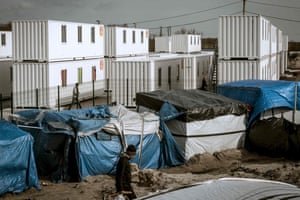 |
| From Lesvos to Izmir to the Calais Jungle to a Seochon hanok - With Robert Mull and Hahm Donkyoon for Citizen Planet Right Now! School Of Politics - Duty of care, #socialresponsibility and the refugees crises 시민행성 당장!정치학교 ( - instagram.com/p/Bc5pX-pFjuA/) |
 |
| 'We've dignified this bottom-up city with the care one would look at Florence or Seoul' (Robert Mull on Calais Jungle exhibitions at Barbican, SouthBank) |
Robert Mull is a citizen of our planet, an educator, and a double agent in the field of architecture:
- On the Dr Jekyll side, Robert has taught all over the globe, and headed prestigious institutions. He is currently Professor of Architecture and Design and Head of School at the University of Brighton, a Visiting Professor at the University of Umea, a partner in Beevor Mull Architects, and Director of Innovation at Publica.
- On the Mr Hyde side, Robert is a relentless activist, and a thorn in the side of an architectural microcosm that too often indulges in navel gazing or disconnected extravaganzas. From his students, he expects bravery, passion with compassion, and an engagement in politics in the noble sense of the term. Even the initials of his Free Unit initiative (now a Global F.U.) send an irreverent message to a trade he often invites to humility (if not self-derision - in the Turncoats series, architects convene to expose their own vanities and impostures).
For five years now, Citizen Planet has called social responsibility to mind. Its new Right Now! School of Politics doesn't have any political agenda, and isn't about ideology or idealism - it simply invites all citizens to embrace their responsibilities and to contribute to a better society. Right Now, because this is an urgent necessity.
 |
| Yours truly, with HAHM Donkyoon (Head of Citizen Planet), and Robert MULL |
Which may seem a distant priority for South Korea, a country posting embarrassing low recognition rates for refugees. Well, we do care for defectors trickling down from North Korea, but could we cope with another major flow? Today? At the very moment China builds massive refugee camps at its border? At a time when, for all we know, Seoulites themselves could be one tweet away from becoming refugees?
Yes, Seoul, the very city that makes refugees of its own citizens, barring them from returning to their childhood's neighborhood...
 |
| The contrast between the anonymous containers erected by the French government, and the vibrant 'jungle' (photo Philippe Huguen - AFP/Getty Image) reminded me of familiar Seoul cityscapes ('apateu' v. 'daldongnae'). |
Refugee crises expose the best and the worst in all of us, providing Robert Mull with powerful examples of ethical approaches, how architects can fulfill what he calls their 'duty of care'.
We truly must care - starting with the words we use, and the way we look at each other, fellow citizens on our only planet.
 |
| 'On the day Calais is demolished the media only mention migrants all reference to refugees has been dropped' (Calais Jungle map - Robert Mull on Twitter - 20161025) |
Seoul Village 2017
Welcome to our Korean Errlines! Follow Seoul Village on Facebook and Twitter
Add this page to your favorites



